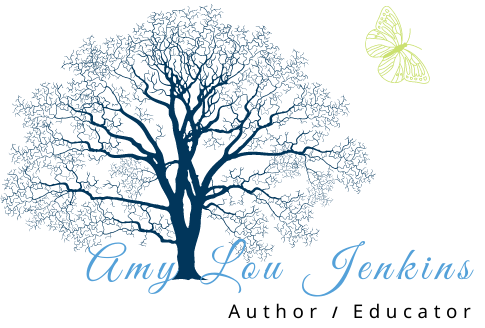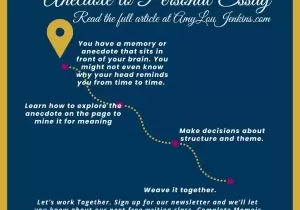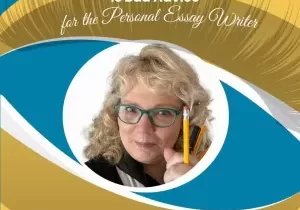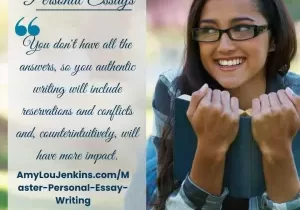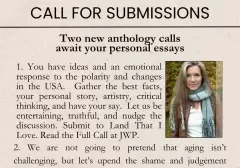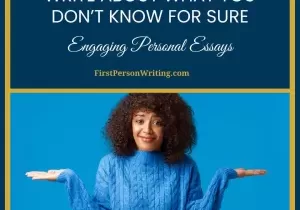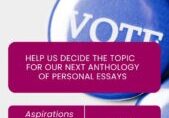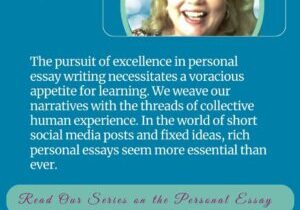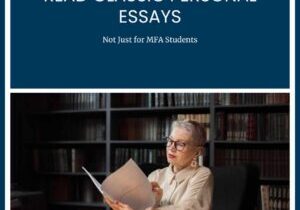
Three Personal Essays About Existence
And the Act of Reading and Researching to Stimulate Novel Thinking
"What the really great artists do is they're entirely themselves. They're entirely themselves, they've got their own vision, they have their own way of fracturing reality, and if it's authentic and true, you will feel it in your nerve endings." --David Foster Wallace
Personal essays about death and existence explore meaty terrain. These three essays offer varied but valid takes on the subject. If you are looking for inspiration for writing a personal essay, reading these three takes on the subject may fire some neurons in your brain that inspire writing ideas. As a part of our series on writing the personal essay, it’s important to consider that understanding the structure and steps of writing isn’t enough.
A personal essay is an attempt to map the writer’s take on a subject. It should stimulate thinking without being prescriptive. It should be fun or thought-provoking to read. Personal essays should honestly confront questions without a simple answer.
Personal Essays Requre Layered Thinking on the Page
Whenever you consider writing a personal essay, do consider different perspectives. Read different takes on a subject. Have a novel experience related to your subject. Leave your writing space and explore. David Foster Wallace went to a lobster fest. Perhaps you will talk to someone with a terminal diagnosis who is open to sharing. You might speak to a service member or law officer who took a life. A bedside experience may influence your work. Studies of cosmology may influence your writing. Your essay may have any focus, yet reading and life experience will feed your work. Do more than sit in a chair and wait for inspiration. Go get it. Start here if the subjects of death and existence interest you.
How Do I Know I’m Not the Only Conscious Being in the Universe?
By John Horgan
John Horgan’s essay, “How Do I Know I’m Not the Only Conscious Being in the Universe?” delves into the philosophical quandary of solipsism—the idea that one’s mind is the only thing that can be known to exist. Published in Scientific American in 2017, Horgan, a science journalist and author, tackles this age-old question with a blend of curiosity and skepticism.
The essay begins with a reflection on the individual’s perception of the world. Horgan highlights the limits of human understanding, stating, “All my sensory experiences could be illusions. How can I know that I’m not dreaming, or a brain in a vat being stimulated by a mad scientist?” This initial premise sets the stage. The essay explores of the uncertainties inherent in grappling with the nature of reality and consciousness.
Horgan examines various perspectives on solipsism, ranging from radical skepticism to metaphysical ponderings. He navigates through thought experiments and philosophical musings, presenting quotes from renowned philosophers like René Descartes, who famously proclaimed, “I think, therefore I am.” Horgan recognizes the allure of solipsism’s simplicity while acknowledging its intellectual challenges. He engages with the works of contemporary philosophers like Daniel Dennett, who offers insights into the interconnectedness of consciousness and the shared experiences of sentient beings.
Like All Good Essays: No Easy Answers--But Lot's of Insight
Throughout the essay, Horgan’s skepticism shines through. He critiques solipsism as an “egomaniacal delusion” and suggests that the theory’s isolationist stance contradicts the inherent social nature of human beings. Drawing from a variety of disciplines, including psychology and neuroscience, Horgan emphasizes the importance of engaging with the world and other minds to refine our understanding of reality.
Horgan’s essay ultimately serves as an exploration of the intricate relationship between consciousness and existence. He acknowledges the tantalizing allure of solipsism’s intellectual challenge. By weaving together philosophical insights and scientific considerations, Horgan guides readers through a contemplative journey. He invites the reader to question the nature of their consciousness and the interconnectedness of all conscious beings.
It’s silly to be frightened of being dead, by Diana Athill
Athill’s essay, “It’s Silly To Be Frightened Of Being Dead,” presents a candid and contemplative exploration of the concept of death., She reflects on its inevitability and the emotional responses thoughts of death elicit. Published in “Alive, Alive Oh!: And Other Things That Matter” (2015), Athill, known for her memoirs and sharp literary insight, honestly confronts mortality. Her proximity to the end of her mortal existence supplies extra gravitas.
Address the Difficult Topics
The essay begins with a stark assertion: “There is nothing interesting about dying.” This directness establishes the essay’s tone as Athill delves into the fear and avoidance often associated with contemplating death. She dissects her own experiences, both as a young woman who used to fear death and as an older person who has come to terms with it. Athill observes, “It is the thought of myself not existing that is hard to bear.” This admission captures the essence of the human struggle with mortality.
Athill seamlessly intertwines her reflections with broader philosophical insights. She acknowledges that humans often fear the unknown, stating, “What I have never been able to decide is whether it is the end of me that I can’t take in or the idea of others going on without me.” This dual perspective taps into the universal dilemma of grappling with the finite nature of life and the infinite expanse of time beyond.
In exploring the irrationality of fearing death, Athill explores her evolving beliefs. She refers to herself as a “vaguely pantheistic non-believer.” While she doesn’t hold conventional religious views, she finds solace in nature and the cyclical rhythms of life and death. This blend of pragmatism and reverence underscores her acceptance of the inevitable.
My Take on Evolving Ideas
I like the writer who changes and refines opinions on the page. Those who cling to their opinions and refuse to change opinions as they learn are changing our nation into a hoard of bullies.
Throughout the essay, Athill’s straightforward prose invites readers to confront their feelings about mortality. She writes, "It is not that I would welcome death. But I am not frightened of it. The essay's main point is that death is a natural part of life and accepting it can lead to a better life.
Diana Athill’s essay offers a meditation on the universal experience of mortality. Athill inspires readers to face their fears, accept the impermanence of life, and find peace in the inevitable.
Consider the Lobster by David Foster Wallace
“Consider the Lobster” by David Foster Wallace is a thought-provoking essay that dives into the ethics of consuming lobsters and, by extension, the broader implications of how humans interact with animals. The essay, which was published in Gourmet magazine in 2004, showcases Wallace’s signature blend of intellectual inquiry, social commentary, and intricate prose.
Wallace’s central question revolves around the moral and ethical aspects of boiling lobsters alive for consumption. He explores this by attending the Maine Lobster Festival and probing the question: Do lobsters feel pain? He riffs on various perspectives on the issue while maintaining an introspective tone.
Thinking Back Across Your Own Thoughts Makes for Honest and Insightfull Essays
Wallace’s ability to scrutinize his reactions and thoughts is one of the essay's defining features. He contemplates his conflicting emotions while watching the lobsters being cooked, describing it as “a paradox at the heart.” This internal struggle reveals the complexity of our relationship with animals and the dissonance between our actions and our moral considerations.
Wallace also raises broader philosophical questions. He questions our right to consume animals. We wonder with him if our sensory biases influence our ethical judgments. He presents the idea that our preference for animals we don’t consider cute or sentient allows us to distance ourselves from their suffering. Wallace asserts, “Is it not possible that future generations will regard our own present agribusiness and eating practices in much the same way we now view Nero’s entertainments or Aztec sacrifices?” This comparison challenges readers to consider the cultural context of our actions and their potential consequences.
In “Consider the Lobster,” David Foster Wallace invites readers to reflect on their own consumption choices, highlighting the cognitive dissonance that often accompanies them. By asking questions and reflecting, he encourages us to consider how our actions impact animals and people. The essay prompts us to consider the broader implications of our consumer choices and the moral responsibility we bear.
Uncommon Places and Good Essays
David Foster Wallace said, "What the really great artists do is they're entirely themselves. They're entirely themselves, they've got their own vision, they have their own way of fracturing reality, and if it's authentic and true, you will feel it in your nerve endings." This sentiment encapsulates the magic that occurs when we delve into a multitude of sources, unearthing unexpected connections and revelations that transcend the boundaries of initial understanding. Just as a painter blends colors to create new shades, a writer amalgamates thoughts to birth novel concepts. Reading widely and actively researching should help you to be starkly you in your writing.
By engaging with a broad range of materials, from scholarly articles to personal anecdotes, we cultivate a reservoir of knowledge that empowers our essays. Each viewpoint absorbed, each concept pondered, adds another brushstroke to the canvas of our thoughts.
The pursuit of excellence in personal essay writing necessitates a voracious appetite for learning. Embracing the wisdom of countless authors and thinkers, we weave our narratives with the threads of collective human experience. In the world of short social media posts and fixed ideas, rich personal essays seem more essential than ever.
